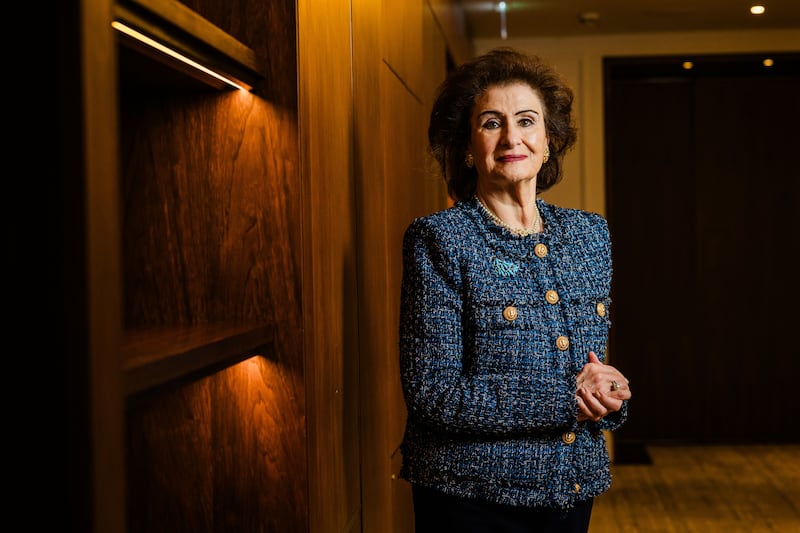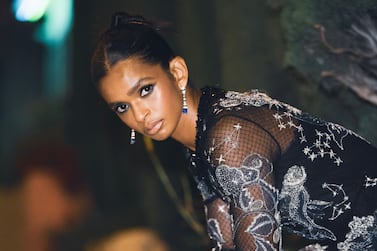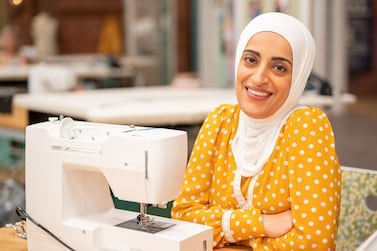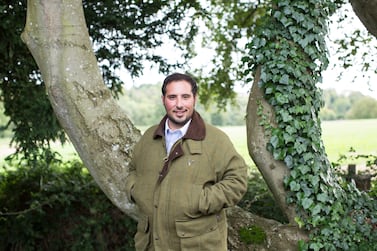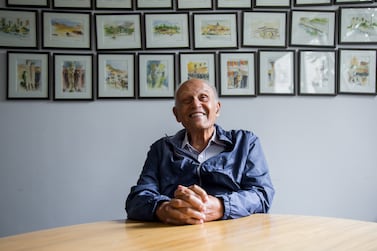Haifa Al Kaylani moves through the Carlton Tower Jumeirah looking as effortlessly elegant as the recently renovated decor of the landmark hotel in the heart of Knightsbridge, London.
Her hair is coiffed, make-up flawless, and a string of pearls and turquoise brooch accessorise a classic cropped bouclé jacket from a Swiss fashion house.
But she walks straight past the diners socialising over salads or the afternoon tea being served all day in the lounge, and gets down to business at a table in a nearby meeting room.
“I’ve never been one of those ladies who lunch,” the development economist and president of the Arab International Women’s Forum (AIWF) tells The National.
As Al Kaylani talks about her remarkable career, in which she has hosted Queen Rania of Jordan and been honoured herself at a reception by Sarah Brown, wife of former UK prime minister Gordon Brown, at No 10 Downing Street, it’s hard to believe there has ever been time for a midday meal.
On the global stage, she is known as a “high-impact change agent” in every area, from leadership, youth empowerment and diversity to education, sustainability and the environment.
The AIWF was founded in 2001 on two key principles dear to her heart: that no economic, political or social development is possible anywhere without optimising the 50 per cent of the population who are female; and that women from the richly diverse 22 Arab countries need to establish bridges between each other and their counterparts everywhere.
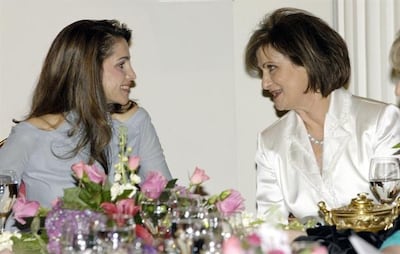
“We broke ground wherever we went,” she says. “We were the first women’s organisation to be hosted by the League of Arab States, the first hosted at the European Parliament, the first invited by the World Bank, the first conference in Madrid between Arab, Spanish and Latin American women, [the then French Minister of the Economy] Madame Lagarde chaired the forum’s annual conference in 2009 in Paris, we were the first to host a conference for business women at the Dubai International Financial Centre.
“And we had key, succinct issues on the table. It was not just about the gatherings, though they were important. Breaking the stereotypes, building knowledge and understanding were very important but we also wanted to ensure we could empower and effect change on the ground … so we walk the walk.’’
In person, Al Kaylani is reserved but warm, overcoming a natural modesty to highlight various successes in the hope of giving them renewed impetus. A story of doing good, she insists, must be told.
Her own is certainly that – a peripatetic life, first as a Lebanese of Palestinian origin and then as the wife of a Jordanian diplomat, fuelled her desire to empower women as “engines of economic growth” to foster development and prosperity in Arab countries.

Both her father, Badr Said Fahoum, the district governor of Acre in Mandatory Palestine whom she credits for her business mind, and mother, Alia Zubi, came from prominent families in Nazareth.
Nakba toddler
They moved, as did hundreds of thousands of others, to Beirut in 1948 during the Nakba when Haifa was a toddler, initially intending to stay only until it was safe to return.
“Nobody knew that they were going to spend the rest of their lives there. They left everything behind.’’
Relatives and friends continued to trickle out of Palestine, some bringing objects from the Fahoum house while those who remained sent letters and news of the events unfolding.
The family was given Lebanese citizenship at the time. An estimated 210,000 Palestinians remain stateless in the country even today, yet Al Kaylani points to how much Beirut owes to these exiled families.

“They made it their home and contributed to the economy, society, culture,” she says.
Haifa’s mother, Alia, was highly educated but took on the responsibility of raising her five daughters. She fostered an appreciation of the siblings’ heritage through stories of their ancestral home before the partition of borders but was keen, too, to ensure that they made the most of life, friends and schooling in Beirut.
Mother's learning
Apart from her love and devotion as a homemaker, Al Kaylani recalls Alia creating a cultural cocoon full of classical music and literature such as the Abbasid-era poetry of Al-Mutanabbi that she recited by heart.
“She was an avid reader. We would go to the mountains every summer, and before we packed our clothes, we used to pack boxes of books because the vacations were supposed to be spent reading and learning, and on sports and outdoor life.’’
After being a pupil at the British Lebanese Evangelical School for Girls in Beirut, fifteen-year-old Al Kaylani was sent to board at Sherborne School for Girls in Dorset to pursue her English education.
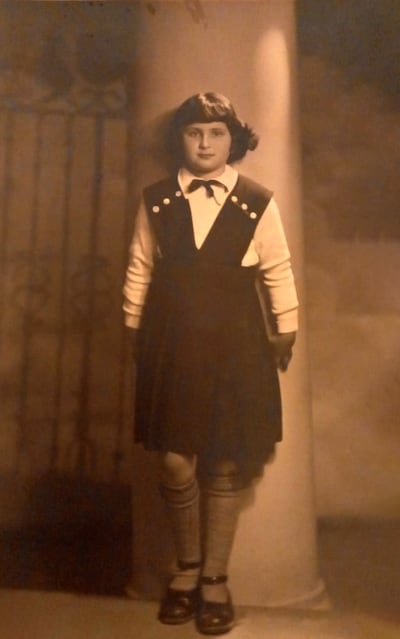
“I loved it,’’ she says, and quotes from her end-of-term reports as testament. “They would say: ‘Haifa’s settled in as if she’s one of us.’ I think this is one of my good traits. I’m adaptable and I’m flexible.’’
The timing of her arrival made it easier not to pine for home despite the pupils having to go out for runs in snow up to their waists. As she explains, the 1962-63 academic year was one “like no other’’, and the pupils eagerly kept up with events on the BBC’s weekly news programme Panorama.
“It was number one, the year of the Big Freeze, the Beatles [with their first hit single Love Me Do], James Bond [Dr No in Sean Connery’s MI6 cinematic debut], the Profumo Affair, the Cuban Missile Crisis, the Vatican Council. I learnt a lot and enjoyed it all,’’ she says.
Al Kaylani chose to study economics at her father’s alma mater, the American University of Beirut, which she calls “that beautiful campus by the sea”, before regrouping with Sherborne friends at Oxford to read the new diploma in development economics.
Next was 12 months as a junior economist at the United Nations Economic and Social Council in Beirut, which enabled her to meet the second of two non-negotiable conditions set for the girls by Badr and Alia.
“We weren't to get married or focus on a family until first having at least a Bachelor of Arts, if not a Master's, and we had to work for one year. When you think about it, they are golden rules. So I’m very glad.
“If we had been five boys, our parents would not have done more in terms of empowerment and providing opportunities. Tashji' [encouragement] non-stop.’’
She set up home in Amman after marrying Wajih Al Kaylani, who used to regale her with vivid tales of walking all over Palestine’s mountains, down hills and into valleys as a boy scout. “This is how you see the place, and get an affinity with the people in the villages,’’ Al Kaylani says.
While giving birth in hospital to her son, Sirri, she heard an announcement on the radio that Wajih had been appointed ambassador to Tunisia by King Hussein of Jordan, “which was a great honour but we asked permission to stay a few more months to allow the baby to grow”.
They immersed themselves in their roles in Tunis and then Delhi where her husband was ambassador to India, Sri Lanka, Nepal and Thailand. “I found myself on another planet. Especially in the evenings, the sounds, the smells were different,” she says, recalling the aroma of firewood burning outside their diplomatic residence.

The couple visited every state in India at the invitation of the governors, and the deep insights gained from travelling as an Arab ambassador’s wife compelled her to take up an MPhil part-time at Jawaharlal Nehru University.
‘I wanted to read more, and Indian economists were the best in economic development at the time.’’
Al Kaylani left the country “with tears in my eyes’’ when Wajih retired from the diplomatic service in a return to the private sector, and London became their base.
After Sirri set off to board at Stowe School in Buckinghamshire, she turned to playing tennis, learning Spanish and Italian, enrolled at London Business School, and began volunteering for Arab and British women’s charitable organisations.
Help was needed for Palestinian refugees, and for Lebanon, which had entered a 15-year civil war. In the 1990s, she was part of a committee raising funds for Iraqi children and recalled the complexities of delivering aid in spite of the UN-led embargo after Saddam Hussein’s invasion of Kuwait. “It was very hard and serious work,” she says.
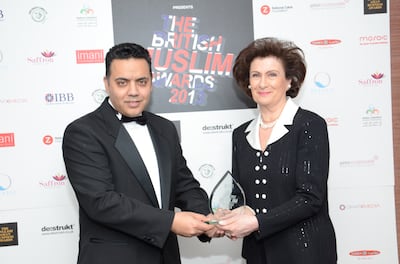
Among her biggest achievements was raising £250,000 ($318,050) for the Queen Alia Fund for Social Development, with Princess Basma as key speaker at an event in 1994.
Al Kaylani recalls a magical evening that transformed The Dorchester’s ballroom into a showcase of Jordanian culture through a fashion parade of “out of this world” Arab costumes, handicrafts and local produce on the tables, and floral arrangements of emblematic black irises and native herbs.
“It was something that London had not seen – neither before nor after,” she says.
“I’m a good fund-raiser. Why? Because I only commit my time and myself if I really believe in the cause, and believe that I can help the cause.
“I learnt a good lesson early in fund-raising, from an English friend. She told me: ‘You must be able to convince me why I should part with my funds for this cause rather than that one.’ So you need to prepare well.’’
Rebuilding the Balkans
She sat on the committee of a charity supporting Bosnian women during the war that was chaired by former UK Prime Minister Margaret Thatcher of whom she was a great admirer. “She revitalised the British economy and put it on track. She brought prosperity back.”
A few years later, Al Kaylani founded the AIWF with the aim of connecting Arab women from all walks of life as “part and parcel’’ of the international community politically, socially and economically.

As the forum has evolved from initially helping with the set-up of businesses to becoming much broader in scope, her intention has been to approach each project not as a feminist but as an economist first and foremost.
London Climate Week
In January 2017, Al Kaylani was chosen as one of 46 global leaders to become a Fellow of the Advanced Leadership Initiative at Harvard University. The key outcome of her fellowship has been an agriculture project being piloted in Jordan for which she secured World Bank funding.
“Following my pivotal year at Harvard, we have been pursuing a sustainability agenda,” she says.
Recently, the AIWF teamed up with Masdar's global initiative Women in Sustainability, Environment and Renewable Energy, known as WiSER, to produce a report for Cop28 in Dubai, and will host the forum’s second conference on the same themes in June at London Climate Week.
Asked how she has maintained such motivation for so many decades, Al Kaylani says: “First, I enjoy what I do – otherwise I would not be doing it. This is the key because then it is from your heart, coming from inside, you’re committed. Most of my work is pro bono and totally voluntary.
“Second, the energy … you need to read, to keep educating yourself. I’m a great believer in lifelong learning. That’s why I went to Harvard. I enjoy my own time like everybody but I love meeting people, and working, learning and connecting with others.”

Arguably the pinnacle of the numerous accolades garnered so far is being appointed an Officer of the Most Excellent Order of the British Empire in King Charles’s New Year’s 2024 Honours List in recognition of services to women, young people and cultural relations between the UK and the countries of the Middle East.
She is thrilled and humbled by the thought of next month’s investiture but says none of it would have been possible without her parents – “I have to pay tribute to them” – and husband Wajih, whose face would beam every time he saw her achieve another milestone.
“My late husband was the best partner in life I could ever have had. Encouraging, loving, empowering. Without him, I promise, I could neither have started nor given so much time to the AIWF to attain what it has and continues to attain now. He was with me every step of the way.”
Al Kaylani goes on to speak of the friends and members from the wider AIWF family, who have all provided invaluable contributions, but soon returns to the source of her own personal impetus.
“Your roots sustain and empower you, those who see you when you are up and down. You know,’’ she says with a small shrug, “all of us are human after all.”
